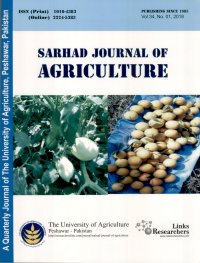Growth, Yield and Economic Analysis of Dry-Seeded Basmati Rice
Shawaiz Iqbal1*, Nadeem Iqbal2, Usama Bin Khalid1, Muhammad Usman Saleem1, Adila Iram1, Muhammad Rizwan1, Muhammad Sabar1 and Tahir Hussain Awan1
ABSTRACT
Planting method is an important aspect of production technology for the maximum resource utilization by crops per unit area. Dry-seeded rice (DSR) is a contemporary resource saving crop establishing technique, which enables farmers to harvest economical rice production. Field study was conducted at Rice Research Institute, Kala Shah Kaku, Pakistan in 2014 and in 2015 to evaluate the different planting methods. Three dry-seeded rice (DSR) planting methods viz. (i) DSR-broadcast, (ii) DSR-drill, (iii) DSR-ridges were compared with the conventional transplanting (TR) method in lines having row to row and plant to plant distance of 22.5cm distance, and farmer transplanting method. Experimental design was randomized complete block, replicated 3 times. Data were recorded on height (cm), tillers m-2, filled and unfilled grains panicle-1, thousand grain weight (g), grain and biomass yield (t ha-1). Grain sterility (%) and harvest index (%) were also calculated. Highest grain yield (5.00 to 5.11 t ha-1) with harvest index (30.00 to 31.50%) and relatively low grain sterility (12.00 to 12.01%) were observed in DSR-ridge and DSR-drill sowing method. Moreover, DSR (i.e. DSR-ridge and -drill) resulted in 104 and 76 % more profit over TR-farmer practice. The study concluded that DSR-ridge and DSR-drill proved to be the best to obtain the maximum paddy yield and net profit. Farmers can adopt these methods to harvest maximum benefit.
To share on other social networks, click on any share button. What are these?







